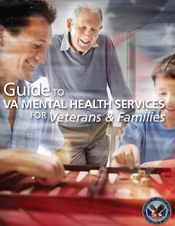Mental Health Services in Virginia

Guiding Principles
The Guide to VA Mental Health Services for Veterans and Families (also available in Spanish : Guia de Servicios de Salud Mental que el Departamento de Asuntos de Veteranos Ofrece a los Veteranos y sus Familias) is intended for Veterans, Veteran family members, members of Veterans Services Organizations, or members of other groups interested in VA mental health care. You can use this handbook to learn what mental health services your local or regional VA health care facility has pledged to provide to Veterans.
The following information has been pulled from the guide, and is intended to serve as a brief overview. Please see the Guide for more detailed information.
Focus on Recovery - Recovery empowers the Veteran to take charge of his/her treatment and live a full and meaningful life. This approach focuses on the individual’s strengths and gives respect, honor, and hope to our nation’s heroes and their families.
Coordinated Care for the Whole Person - VA health care providers coordinate with each other to provide safe and effective treatment for the whole person—head to toe. Having a healthy body, satisfying work, and supportive family and friends, along with getting appropriate nutrition and exercising regularly, are just as important to mental health as to physical health.
Mental Health Treatment in Primary Care - Primary Care clinics use Patient Aligned Care Teams (PACTs) to provide the Veteran’s healthcare. A PACT is a medical team that includes mental health experts.
Mental Health Treatment Coordinator - Veterans who receive specialty mental health care have a Mental Health Treatment Coordinator (MHTC). The MHTC’s job is to understand the overall mental health goals of the Veteran.
Around-the-Clock Service - Emergency mental health care is available 24 hours per day, 7 days per week at VA medical centers. If your VA does not have a 24-hour emergency room, it must provide these services through a local, non-VA hospital. Telephone evaluations at VA medical centers and the national crisis hotline are also available 24/7.
Care that is Sensitive to Gender & Cultural Issues - VA health care providers receive training about military culture, gender differences, and ethnic issues in order to better understand each Veteran.
Care Close to Home - VA is moving closer to where Veterans live by adding more rural and mobile clinics and working with other health care providers in the community.
Evidence-Based Treatment - Evidence-based treatments are treatments that research has proven are effective for particular problems. Mental health providers receive training on a wide variety of proven treatments. Mental health providers must offer evidence-based treatments to Veterans.
Family & Couple Services - Sometimes, as part of a Veteran’s treatment, some members of the Veteran’s immediate family or the Veteran’s legal guardian may be included and receive services, such as family therapy, marriage counseling, grief counseling, etc.
Finding Care
If you have a mental health emergency (like wanting to hurt yourself or someone else), go to the nearest hospital emergency room or call 911. If it is not a VA hospital, you may be able to move to a VA facility depending on your circumstances. If you are feeling suicidal, you can also call, text, or chat online with the Veterans Crisis Line. The Veterans Crisis Line connects Veterans in crisis and their families and friends with qualified, caring Department of Veterans Affairs responders through a confidential toll-free hotline, online chat, or text. To speak with a responder by phone, call . To chat online go to To text with a responder, send a text message to 838255. These confidential support options are available 24 hours a day, 7 days a week, 365 days a year.
If you have a mental health problem and have never been seen in a VA hospital or clinic, you can:
If you are already using VA medical services, ask your primary care provider to arrange for you to see a VA mental health provider.
 Please see the Guide for information on How You Know If You Have A Mental Health Problem (page 9) and What Will Happen When You Request Mental Health Services (page 10).
Please see the Guide for information on How You Know If You Have A Mental Health Problem (page 9) and What Will Happen When You Request Mental Health Services (page 10).
Treatment Settings & Services
VA offers a range of treatments and services to improve the mental health of Veterans.
VA offers treatments in a variety of settings, including:
Short-term, inpatient care;
Outpatient care in a psychosocial rehabilitation and recovery centers (PRRC);
Regular outpatient care, which may include telemedicine services;
Residential Rehabilitation Treatment Programs (RRTP);
Primary care;
Residential care;
Supported work settings.
Examples of common mental health treatments for Veterans include:
Treatments for Depression and Anxiety
Antidepressant medications, anti-anxiety medications, and medications to improve sleep and other problems
Talk therapies (also called psychotherapies), such as:
Cognitive behavioral therapy (CBT) to help individuals understand the relationship between thoughts, emotions, and behaviors, learn new patterns of thinking, and practice new positive behaviors (relaxation techniques, using calming tapes to improve sleep, exercising, or socializing with friends)
Acceptance and commitment therapy (ACT) to help people overcome their struggles with emotional pain and worries. It helps them recognize, commit to, and achieve what’s important to them
Interpersonal therapy (IPT) to help people promote positive relationships and resolve relationship problems.
Treatments for Substance Use Disorders (SUD)
Medications to decrease cravings for alcohol and medications to ease withdrawal (“detox”) from alcohol and drugs. Medications like buprenorphine and methadone can also be used as therapeutic substitutes for illegal drugs (heroin) or addictive prescription pain medications.
Talk therapies (also called psychotherapies), such as:
Motivational enhancement therapy to help the individual strengthen his/ her commitment to recovery
Cognitive behavioral therapy to help the individual identify the risks for relapse and learn new coping skills to avoid relapse.
Opioid Treatment Programs (OTPs) help Veterans who misuse Opioids. Opioids include illegal substances, such as heroin, and legally prescribed medications such as some prescription pain medications.
Source: www.mentalhealth.va.gov
RELATED VIDEO
Governor talks about mental health concerns in Virginia
Mental health system eyed in Virginia tragedy
Virginia Mental Health (Benevolent Family Services)
Related posts
FEBRUARY 23, 2026
What is the Community Mental Health Services Block Grant (MHBG)? The MHBG program s objective is to support the grantees…
Read More
FEBRUARY 23, 2026
Community Behavioral Health (CBH) is a not-for-profit 501c (3) corporation contracted by the City of Philadelphia to provide…
Read More

 Please see the Guide for information on How You Know If You Have A Mental Health Problem (page 9) and What Will Happen When You Request Mental Health Services (page 10).
Please see the Guide for information on How You Know If You Have A Mental Health Problem (page 9) and What Will Happen When You Request Mental Health Services (page 10).













